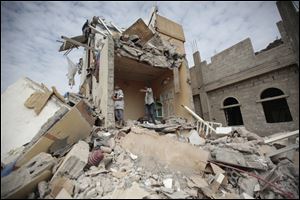
EDITORIAL
Saudis not alone in blame for Yemen
10/11/2017

The UN’s leading human rights body has approved by consensus a compromise resolution calling for a group of “eminent international and regional experts” to monitor and report on rights abuses in war-torn Yemen.
Saudi Arabia is poised to be labeled a major human rights violator for its involvement in the Yemen civil war. The United States would be a party to the violation, based on its support of the Saudi military.
The conflict in Yemen is hopelessly complex. Yemen is a miserable piece of land, with a population of 25 million, the poorest country in the Middle East. The suffering of the Yemeni people as the war stretches into its third year is also hopeless in terms of the world’s ability to measure it. Tens of thousands have been killed. Another more than half-million Yemenis are afflicted with cholera, an epidemic brought about by damage from bombing of its already limited infrastructure, including health care institutions. According to the global relief organization Oxfam, the cholera cases could exceed 1 million by November. Moreover, more than 6 million people are at risk of famine.
Click here to view more Blade editorials
The root of the conflict is the Sunni vs. Shiite Muslim struggle in the region, with Saudi Arabia leading the Sunnis and Iran the Shiites. The Saudis support the government of unelected Yemeni President Abdu Rabu Mansour Hadi, a Sunni. The Iranians support the rebel Houthis, who control a big piece of Yemen, including the capital, Sana. A swing force is former Yemeni President Ali Abdullah Saleh, a Sunni, and the battleground includes other ethnic and faith-based militias, including some reportedly affiliated with al-Qaeda and the Islamic State, although that is not clear.
U.S. support of the Saudis risks America being implicated in the kingdom’s human rights abuses, reaching toward war crimes, in the conflict. The United States has provided logistics and intelligence support to the Saudis in the years of relentless bombing of Yemen. Saudi military jets, for example, are refueled midair by U.S. planes, allowing for a faster pace of bombing. America also has boots on the ground in Yemen, in an intelligence and training role. One U.S. Navy Seal was killed there in January.
The U.N. Human Rights Council late last month agreed on an international investigation into activities carried out during the war in Yemen since 2014. Its work will inevitably finger the United States, on its own and in support of the Saudis. In addition, the Saudi coalition has been named in a draft of the United Nations’ annual blacklist for violations against children in conflict. The document also condemns the actions of Houthis, Yemen government forces and other combatants; a final version will be released later this month.
The basis of U.S. support of Saudi Arabia in this endeavor is previous and ongoing arms sales, including fighter-bombers and tanks, to the Saudis. The most recent announced event was this month, when a $110 billion U.S. sale, announced during President Trump’s May visit to the kingdom, was made official.
America needs to think long and hard as to whether it wants to end up being accused by the world of having been involved in human rights abuses and possible war crimes in Yemen in order to support its companies’ arms sales to Saudi Arabia.